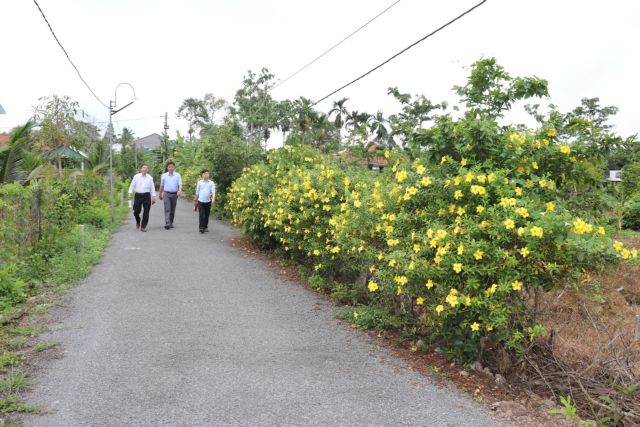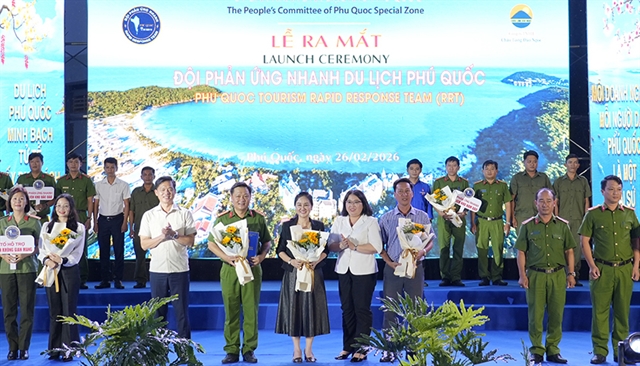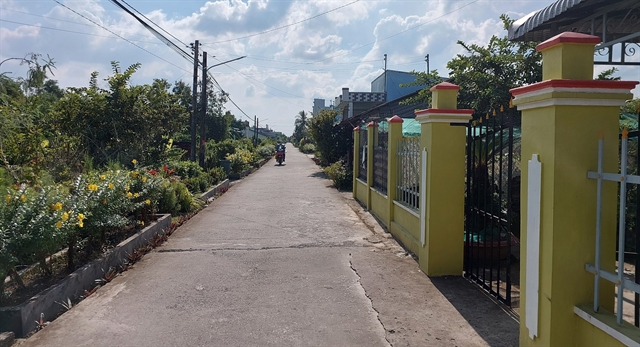 Society
Society

 |
| A rural road in Bạc Liêu Province. The province has been efficient in implementing the new-style rural area programme, improving the lives of rural people. — VNA/VNS Photo Tuấn Kiệt |
BẠC LIÊU — The development of new-style rural areas in Bạc Liêu Province has significantly improved the appearance of rural areas and the quality of life for locals.
The Cửu Long (Mekong) Delta province has the distinction of having all 49 of its communes recognised under the national new-style rural area development programme after 15 years of dedicated implementation.
A new-style rural commune must meet 19 criteria in areas such as infrastructure, irrigation, electricity, environmental protection, income generation, education, healthcare, social security, and cultural development.
Further advancement is possible through achieving higher standards across these 19 criteria, leading to classification as advanced and exemplary new-style rural communes.
The province has 22 classified as advanced and eight as exemplary.
Phước Long District stands out as a prime example of successful programme implementation.
Nguyễn Chí Thiện, secretary of the Phước Long Party Committee, acknowledged the district's challenging starting point, with communes initially meeting fewer than seven criteria and grappling with poor infrastructure, low per capita income and a high poverty rate.
Through the active engagement of local residents, the district saw all seven of its communes attaining new-style rural commune status.
In 2017, it was recognised as a new-style rural district, he said.
The district has witnessed transformative changes, including the paving of rural roads, the replacement of wooden bridges with concrete structures and the rebuilding of dilapidated houses with modern, concrete dwellings, all of which have significantly enhanced the lives of local residents, he said.
Đinh Hoàng Quân, a resident of the district's Phước Long Commune, was initially sceptical about the possibility of comprehensive infrastructure development and the prospect of achieving the current level of prosperity for local residents.
He expressed satisfaction with the substantial improvements in the spiritual and material well-being of the local community, and pledged his family's continued active participation in the programme to further enhance the quality of life in the community.
In Hồng Dân District, residents of Ninh Thạnh Lợi A Commune have experienced a remarkable improvement in their living standards, with average per capita income approaching VNĐ100 million (US$4,000).
Many households now enjoy annual incomes exceeding VNĐ1 billion ($40,000).
Phan Thanh Sung, secretary of the commune Party Committee, referred to the strategic investments made in infrastructure as crucial factors in improving living standards.
Furthermore, the commune has successfully implemented effective farming models and disseminated advanced agricultural techniques to enhance production efficiency and boost income generation, he said.
Many people in the province have embraced the new-style rural area development programme, realising they are its direct beneficiaries. Many have contributed land and labour for the construction of essential infrastructure.
Phan Minh To, a resident of Vĩnh Lộc A Commune in Hồng Dân District, exemplifies this community spirit, having donated over 1,000 square metres of land for the construction of roads, a bridge and a community centre.
His family has also helped in the construction of roads.
He emphasised the crucial role of rural road construction in facilitating the movement of people, the transportation of goods, economic development, and ultimately, the improvement of living standards for local residents.
According to the commune People's Committee, Vĩnh Lộc A has witnessed the generous contributions of hundreds of households for the development of essential transportation infrastructure.
Phạm Văn Thiều, chairman of the provincial People's Committee, underscored the enduring nature of the new-style rural area development programme, emphasising that the journey of progress is continuous, even for communes or districts that have achieved exemplary new-style rural area status.
The province prioritises the development of exemplary models, particularly in the areas of ecological agriculture, digital transformation in agricultural practices and high-tech agriculture, with the ultimate goal of continuously improving the spiritual and material well-being of local residents while seamlessly integrating new-style rural area development with urbanisation efforts.
He stressed the critical importance of establishing comprehensive management, utilisation and maintenance plans for completed infrastructure facilities to maximise their capacity in supporting socio-economic development within each locality.
While rural areas have become aesthetically pleasing and economically prosperous, maintaining social security and order remains paramount.
The province is currently focused on developing advanced new-style rural communes with an urban focus, prioritising the development of production and co-operatives in conjunction with the promotion of "One Commune One Product" initiatives.
Record agricultural growth
Bạc Liêu has achieved a remarkable agricultural growth rate of 7 per cent in 2024, a new record.
Seafood exports for the year are estimated at $1.2 billion, with shrimp accounting for $1.13 billion.
Thiều emphasised the province's commitment to becoming a leading national centre for the shrimp industry, driving improvements in high-tech shrimp farming practices.
He reiterated the province's aspiration to become a maritime powerhouse, leveraging its maritime resources for economic prosperity.
He instructed the Department of Agriculture and Rural Development to implement effective agricultural restructuring strategies to enhance product value.
The integrated shrimp-rice farming model has proven to be highly successful in increasing product value, as both shrimp and rice produced under this system are classified as clean products.
The province has actively encouraged farmers to utilise high-quality rice seeds for cultivation and has actively promoted the adoption of ecological shrimp-rice farming practices.
Currently, the province boasts over 46,800ha of land dedicated to shrimp-rice farming, with an ambitious target of expanding this area to 70,000ha.
High-tech shrimp farming models have demonstrated significantly higher yields, ranging from 10 to 15 times greater than conventional methods.
The province has established five high-tech shrimp farming zones, encompassing a total area of 3,900 hectares.
Furthermore, the province is proud to possess two biosafety shrimp farming zones that adhere to international standards. — VNS